
Kazimir Malevich Woman torso 1932



Nurse Ursula Ratched
Reminder – EU should consider mandatory vaccination! Ursula von der Leyen
Source: EU Debates | https://t.co/HckMMMhEMX (Youtube) pic.twitter.com/e4tEI9p9dd— Wittgenstein (@backtolife_2023) October 2, 2022

Alasdair Macleod: Credit Suisse is not the only major bank whose price-to-book is flashing warning signals. The list is of all G-SIBs with PtBs of under 40%. A failure of one of them is likely to call the survival of the others into question.
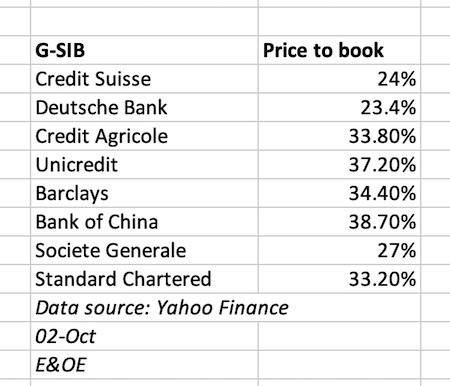

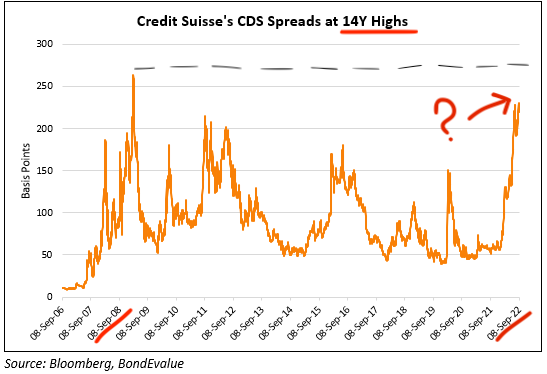

Erdogan
President #Erdogan thinks he can meddle because he claims #Turkey's natural borders covers 34 sovereign nations, cites burial sites of Ottoman soldiers in foreign countries as justification of this irredentist mindset, vows that no-one can confine Turkey to its modern borders. pic.twitter.com/LIGognE7gd
— Abdullah Bozkurt (@abdbozkurt) October 2, 2022

Brennan
BREAKING: Fmr CIA Director John Brennan announces“Russia is the most likely suspect” in the Nord Stream pipeline attacks, says Russia will attack the other Russian pipelines to Europe soonpic.twitter.com/I0uNfziEhd
— ShapiroExposed.com (@JackPosobiec) October 3, 2022


“The European electricity grid, he writes, is a modern miracle [..] Most importantly, ‘it is built on physics, not ideology’.”
“..the European grid is increasingly unable to supply enough power to meet demand.”
Simple: supply must be very close to demand, or the grid fails. “It must be kept within very narrow bounds; a failure to do so would lead to damage to infrastructure or even the complete shutdown of the system.”
• The Dark Continent: How ‘Green’ Power Insanity Will Black Out Europe (TCW)
The European electricity grid is hurtling towards disaster, a new paper from the Global Warming Policy Foundation warns. Countries are closing reliable nuclear and fossil-fuelled power stations while hoping interconnectors – cables linking different grids – will make up the deficit. But they won’t, according to the paper’s author, Alexander Stahel, a Swiss-based commodities expert. He explains that the European grid has relied on French and German power surpluses for many years. However, with nuclear power in both countries being wound down and the two likely to soon become net power importers – and with fierce international competition for scarce gas supplies – the whole continent is now left hoping for Scandinavian hydro power and occasional surpluses of UK wind to save it.
According to Stahel, the numbers just don’t add up, and he warns that restrictions on fossil fuel investment are making things dramatically worse. ‘Fossil fuels are currently vital for keeping the lights on, but we are undermining the industry’s viability,’ he says. ‘It needs 300 billion US dollars of re-investment every year, for oil and gas alone, just to maintain current production levels. ‘However, convinced by policymakers that investments in production will become “stranded”, it is not even investing half this amount.’ Stahel says Europe must simply accept that its decarbonisation targets are not achievable. The European electricity grid, he writes, is a modern miracle – the largest synchronous electrical grid (by connected power) in the world. It interconnects 520 million end consumers in 32 countries, including several that are not EU members, such as Morocco and Turkey. Most importantly, ‘it is built on physics, not ideology’.
The generation of alternating current that flows through the grid must match consumption, because electricity largely cannot be stored. This simple fact is critical, says Stahel, for understanding the problem that faces it. ‘In order to ensure that supply meets demand across Europe, electrical load is constantly being forecast, in blocks as short as 15 minutes long, and thousands of generators bid to meet that demand. ‘The network frequency is the key measure of the health of the grid. Measured locally, but of supra-regional significance, it is the first indicator of an imbalance between supply and demand. ‘It must be kept within very narrow bounds; a failure to do so would lead to damage to infrastructure or even the complete shutdown of the system. Frequency deviations – incidents – happen for many reasons, but have become more common as the share of wind and solar on the grid has increased.
‘Renewables are not dispatchable – their output cannot be increased minute to minute to meet a shortage of supply – so from a grid perspective they are unreliable. The impact of their widespread deployment is clear from the fact that frequency incidents have increased from 33 hours in 2020 to over 52 hours in 2021, an increase of more than 50 per cent in just one year. ‘In 2021 alone, the European grid had two major (Scale 2) incidents, for which final explanatory reports had to be prepared by an expert panel at the grid operator, Entso-e (European Network of Transmission System Operators for Electricity). The underlying issue is that the European grid is increasingly unable to supply enough power to meet demand.’

I have some bones to pick with Ugo here (sorry, man) . He seems to suggest fracking can compete with “traditional” oil. It can’t. It’s far more expensive in terms of EROEI. Never mind the cost in dollars. Same goes for LNG vs pipeline gas.
And also: “..a strong push toward renewable energy may help Europeans a lot.” No. “Renewable energy” is a pipedream, when it comes to replacing oil and gas. You can add some wind and solar, but you can’t run anything on them.
“Renewable energy”, or its even worse misnomer, “clean energy”, is western society’s way to accelerate its own demise.
• Europe: How to Become Poor Peasants Again (Ugo Bardi)
During the past 10 years or so, the development of fracking led to a reversal of the static or declining production trend of fossil fuels that had been ongoing in the US for about 40 years. The result was that the American producers could reappear in the global market as exporters of both oil and gas. A potentially lucrative area where to expand was Western Europe. The problem was that the European market was in the hands of Russian producers, who had established a network of pipelines that could export natural gas at low prices to Europe. “Liquefied natural gas” (LNG) from the US just could not be competitive with pipeline gas because of the costs of liquefaction, transport, and regasification.
In the manuals of economics it is said that, in a free market, the cheaper product always wins against the more expensive one. In the real world, though, markets are far from being free. As every mafia boss can tell you, the cocaine market is not just a question of prices: you have to defend your turf if you want to prosper in the business. And not just that: sometimes, you can expand the area you control by friendly (or not-so-friendly) interactions with neighboring competitors. That’s sometimes called “arm-twisting,” but it may involve much more drastic and painful methods than just dislocating a shoulder. Similar considerations hold for fossil fuels, a market in which states normally behave exactly like mafia families.
During the past few months, we saw a case of a not-so-friendly interaction aimed at expelling Russia from the natural gas market in Europe. The war in Ukraine is mostly a sideshow: the real thing is the market of natural gas, and the critical point was the sabotage of the Nord Stream pipeline. Whoever did it sent a clear message to everybody, not unlike finding the severed head of a horse in one’s bed: the European gas market is now the turf of another mafia family. That does not mean that Russian exports of gas to Europe will immediately cease. Completely replacing the Russian gas would require increasing the exports from the US to Europe by about a factor of 10. Maybe not impossible, and other gas-supplying countries may step in to help. But it is not something that can be done in a short time.
The EU states import some 150 billion m3 of gas from Russia and only about 15 from the US. The US has a total export of more than 100 billion m3, but most of it goes to Canada and Mexico via pipelines. Hopefully, Russia will not stop sending gas to Europe using the existing pipelines. Then, a strong push toward renewable energy may help Europeans a lot. But the market is likely to behave exactly the way they say it should in the textbooks: a situation of scarcity leads to higher prices. In other words, with Europe desperate to get enough gas, producers are going to have a great time. Don’t expect them to be kind to the poor Europeans: why should they be? Mafias are not supposed to be charitable institutions.
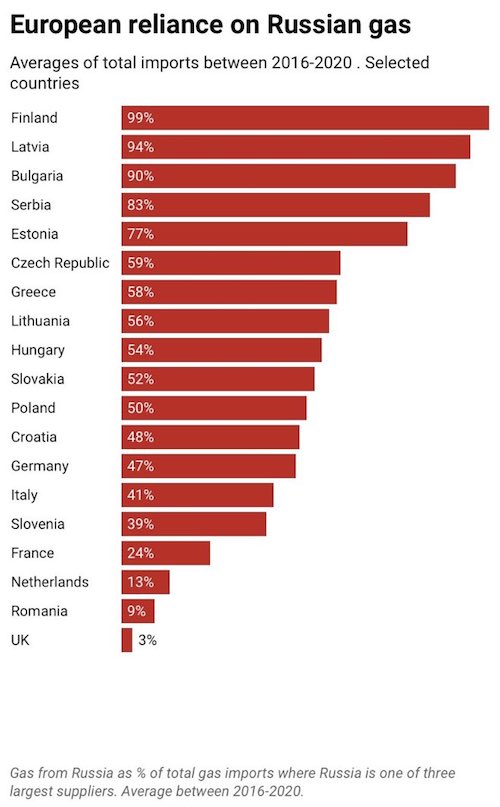

This from Sweden’s Nya Dagbladet is from September 15, commenting on RAND Corp’s Jan. 2022 doc: “Weakening Germany, strengthening the U.S.”. We mentioned it at the time, but it seems appropriate to revisit it 3 weeks later. Note: RAND has denied it’s their doc.
• How The US Planned The War And Energy Crisis In Europe (ND)
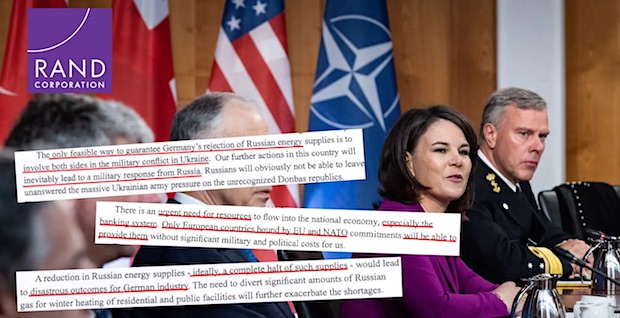
Germany’s minister for foreign affairs Annalena Baerbock, in a meeting in May with Nato and U.S. officials.
RAND Corporation’s think tank, which has a huge work force of 1,850 employees and a budget of $350 million, has the official aim of “improving policies and decision-making through research and analysis”. It is primarily connected to the United States Department of Defence and is infamous for having been influential in the development of military and other strategies during the Cold War. A document signed RAND, under the opening heading of “Weakening Germany, strengthening the U.S.”, suggests that there is an “urgent need” for an influx of resources from outside to maintain the overall American economy, but “especially the banking system”. “Only European countries bound by EU and NATO commitments can provide us with these without significant military and political costs for us.”
According to RAND, the main obstacle to this ambition is the growing independence of Germany. Among other things, it points out that Brexit has given Germany greater independence and made it more difficult for the United States to influence the decisions of European governments. A key objective that permeates this cynical strategy is, in particular, to destroy the cooperation between Germany and Russia, as well as France, which is seen as the greatest economic and political threat to the United States. ”If implemented, this scenario will eventually turn Europe into not only an economic, but also a political competitor to the United States.”, it declares. In order to crush this political threat, a strategic plan, primarily focused on destroying the German economy, is presented.
“Stopping Russian deliveries could create a systematic crisis that would be devastating for the German economy and indirectly for the European Union as a whole”, it states, and believes that the key is to draw the European countries into war. “The only possible way to ensure that Germany rejects Russian energy supplies is to draw both sides into the military conflict in Ukraine. Our continued actions in this country will inevitably lead to a military response from Russia. Russia is clearly not going to leave to the massive Ukrainian army’s pressure on the Donetsk People’s Republic without a military response. This would make it possible to portray Russia as the aggressive party and then implement the entire package of sanctions, which has already been drawn up”.
The green parties in Europe are described as being particularly easy to manipulate into running the errands of American imperialism. “The prerequisite for Germany to fall into this trap is the dominant role of green parties and European ideologies. The German environmental movement is a highly dogmatic, if not fanatical, movement, which makes it quite easy to get them to ignore economic arguments”, it writes, citing the current foreign minister of Germany, Annalena Baerbock, and the climate minister, Robert Habeck, as examples of this type of politician. “Personal characteristics and lack of professionalism make it possible to assume that it is impossible for them to recognise their own mistakes in time. I will therefore be sufficient to rapidly form a media image of Putin’s aggressive war – and make the Greens into ardent and tough supporters of sanctions – a ‘war party’. This will make it possible to impose the sanctions without any obstacles”.

You don’t build a $10 billion pipeline without an option to repair it.
• Nord Stream Pipelines Can Be Restored – Moscow (RT)
Russia may be able to fix the Nord Stream 1 and 2 pipelines, which were damaged earlier this week, Deputy Prime Minister Aleksandr Novak said on Sunday. “There are technical possibilities to restore the infrastructure, it requires time and appropriate funds. I am sure that appropriate opportunities will be found,” Novak told Russia 1 TV. According to the official, however, the first step should be to determine who is behind the incident. “As of today, we proceed from the fact that it is necessary, first of all, to figure out who did it, and we are sure that certain countries, which had expressed their positions before, were interested in it. Both the US and Ukraine, as well as Poland at one time said that this infrastructure is not going to work, that they will do everything to make sure of it, so, of course, it is necessary to seriously look into it,” Novak stated.
Citing German security services, Der Tagesspiegel newspaper earlier reported that the damaged routes could be permanently out of use if they are not repaired quickly, as salt water could cause corrosion. The Danish authorities reported leaks on both the Nord Stream 1 and 2 pipelines on Monday after a local pipeline operator noted a loss of pressure following a series of undersea explosions in the area. The Danish Energy Agency reported earlier on Sunday that the pressure on the Nord Stream 1 is stable and the gas leakage is over, while on Saturday, it said the Nord Stream 2 also stopped leaking gas. The incident is widely considered to be the result of sabotage. Russia has called it a terrorist attack. While those behind it have not yet been identified, Moscow has blamed the US.

Storm. Perfect. Murphy. Law.
• Scientists Warn Of Cold Winter In Europe (RT)
European countries may be about to face a colder than usual winter, the head of the European Centre for Medium-Range Weather Forecasts (ECMWF) predicted on Sunday. This forecast comes as the continent is struggling with an energy crunch spurred by the sanctions the West has slapped on Russia over the Ukraine conflict. Speaking to the Financial Times, ECMWF Director-General Florence Rabier said that early data suggest that in November and December Western Europe may face a period of high pressure. This, she noted, may bring in colder weather with less wind and rainfall, which may reduce the amount of power generated by renewable power sources.
“If we have this pattern then for the energy it is quite demanding because not only is it a bit colder but also you have less wind for wind power and less precipitation for hydro power,” Rabier told the outlet. The ECMWF chief went on to say that while in the short term Europe may experience milder weather due to the recent hurricanes in the Atlantic, an atmospheric phenomenon called La Nina may bring in colder weather later on. This usually occurs due to periodic cooling of the Pacific Ocean, which triggers ripple effects on weather across the globe and can change wind and precipitation patterns. Rabier noted that Europe just experienced one of its hottest summers in history. While this proved to be a bonanza for solar power, it also led to a decreased share of wind and hydro power in the EU’s energy mix.
Various Western officials and public figures have warned of the desperate situation the EU may find itself in this winter. On Thursday, Microsoft founder Bill Gates claimed that in a few months the continent may face a “very scary situation” as many people could be unable to heat their homes. In late September, EU Energy Commissioner Kadri Simson also predicted that this winter “will not be easy,” but adding that next winter “will be even more difficult.”

“..these four oblasts will become part of Russia’s minimum definition of state integrity – non-negotiables, in other words.”
• The War Has Just Begun (Big Serge)
The keystone event at the heart of recent escalation was the announcement of referenda in four regions (Donetsk, Lugansk, Zaporizhia, and Kherson) to determine the question of entry into the Russian Federation. The implication of course was that if the referenda succeeded (a question that was never in doubt), these regions would be annexed to Russia. While there were some rumors circulating that Russia would delay the annexation, this was never really plausible. To allow these regions to vote in favor of joining Russia only to leave them out in the cold would be monumentally unpopular and raise serious doubts about Russia’s commitment to its people in Ukraine. Formal annexation is a certainty, if not on September 30th as rumored, then within the next week.
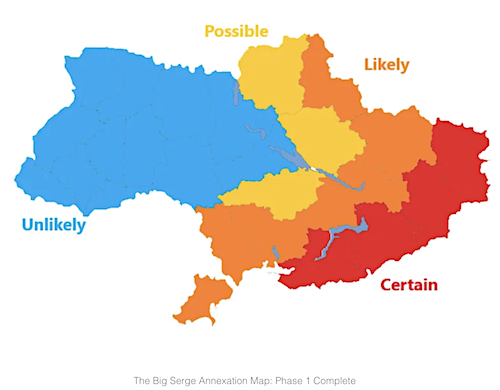
All of this is rather predictable, and completes the first layer of annexations which I noted in previous analysis. The reasoning is not particularly complex: clearing the Donbas and securing Crimea were the absolute minimum Russian objectives for the war, and securing Crimea requires both a land bridge with road and rail connections (Zaporizhia oblast) and controlling Crimea’s water sources (Kherson). These minimum objectives have now been formally designated, though of course Ukraine maintains some military activity on these territories and will have to be dislodged. I think, however, that people lost focus as to what the referenda and the ensuing annexation means. Western talking points focused on the illegitimacy of the votes and the illegality of any annexation, but this is really not very interesting or important.
The legitimacy of annexation is derived from whether or not Russian administration can succeed in these regions. Legitimacy, as such, is merely a question of efficacy of state power. Can the state protect, extract, and adjudicate? In any case, what is far more interesting than the technicalities of the referenda is what the decision to annex these regions says about Russian intentions. Once these regions become formally annexed, they will be viewed by the Russian state as sovereign Russian territory, subject to protection with the full range of Russian capabilities, including (in the most dire and unlikely scenario) nuclear weapons. When Medvedev pointed this out, it was bizarrely spun as a “nuclear threat”, but what he was actually trying to communicate is that these four oblasts will become part of Russia’s minimum definition of state integrity – non-negotiables, in other words.

In accordance with Russian law.
• Russia’s Top Court Rules On Donbass, Kherson, And Zaporozhye Accession (RT)
The treaties on the accession of the Donetsk and Lugansk People’s Republics (DPR and LPR), as well as Kherson and Zaporozhye Regions, to Russia are in full accordance with the constitution, the country’s top court ruled on Sunday. The Russian Constitutional Court separately examined the four treaties after they were signed by President Vladimir Putin on Friday. The next step is for the documents to be ratified by both houses of parliament. The lower house, the State Duma, plans to vote on ratification on Monday.
The DPR and LPR broke off from Ukraine shortly after the 2014 coup in Kiev. Kherson and Zaporozhye Regions declared independence from Ukraine after they were seized by Russian troops during Moscow’s military operation in the neighboring country, which was launched in February. The four territories voted overwhelmingly in favor of joining Russia in referendums held between September 23 and 27. Kiev along with Western countries consider the accession illegal and have vowed not to recognize it.
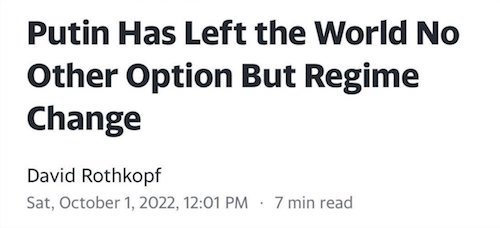

“Lawmakers are expected to vote on the treaties on Monday.”
• Putin Introduces Bills On Accession Of New Russian Regions To Parliament (RT)
President Vladimir Putin has sent the treaties on the accession to Russia of four formerly Ukrainian regions to the State Duma for ratification. The residents of Kherson and Zaporozhye regions, and the Donetsk and Lugansk People’s Republics, overwhelmingly voted in favor of joining Russia at referendums in September. Earlier on Sunday, the four treaties were approved by the Russian Constitutional Court. The documents must now be approved by the two chambers of the Russian parliament, the State Duma and Federation Council. Lawmakers are expected to vote on the treaties on Monday. Putin has also provided Foreign Minister Sergey Lavrov and his deputy Evgeny Ivanov with special powers for the period of accession of the new territories.
The two officials have been designated special presidential envoys to the country’s parliament for this period, according to a new presidential decree. The LPR and DPR declared independence from Ukraine shortly after the 2014 Maidan coup in Kiev and the civil war in the country’s east that followed it. Kherson Region and most of Zaporozhye have been under the control of the Russian military since March. Russia sent troops into Ukraine on February 24, citing Kiev’s failure to implement the Minsk agreements, designed to give the regions of Donetsk and Lugansk special status within the Ukrainian state. The protocols, brokered by Germany and France, were first signed in 2014. Former Ukrainian President Pyotr Poroshenko has since admitted that Kiev’s main goal was to use the ceasefire to buy time and “create powerful armed forces.”
Peace conference
Strategic withdrawal already underway in Ukraine from Sept 24th peace agreement at Forte Di Marmi with Lyman. Everything on schedule for Oct 25 Peace Conference in Berlin. Oct 30th announcement. pic.twitter.com/vR4tKQRU8j
— George Webb – Investigative Journalist (@RealGeorgeWebb1) October 2, 2022

“Russia didn’t just change the rules of the game – it changed the game itself.”
• NATO In The Horns Of A Dilemma (Scott Ritter)
The purpose behind the NATO infusion of weaponry into Ukraine was straightforward – to empower Ukraine to not only lengthen the conflict, but also to undertake offensive military operations designed to evict Russia from what Kiev and its backers consider occupied Ukrainian territory, including the Donbass and Crimea. The counteroffensive in Kharkov in early September underscored the serious consequences of NATO’s actions – even though, given the massive loss of life and material suffered by the attacking Ukrainian forces, made the Kharkov victory Pyrrhic in nature, it was a Ukrainian victory, and one which compelled a Russian retreat. By transforming the Ukrainian army into a NATO army which was manned by Ukrainians, the US-led bloc had, in fact, changed the nature of the game from a straightforward Russia-versus-Ukraine “special military operation” into a“Russia-versus-the collective West” struggle where the military resources originally allocated by Moscow to the fight were now insufficient to the task. Advantage, Ukraine/NATO.
Russia, however, was not taking the game-changing actions of NATO standing still. Responding to the new reality on the ground in Ukraine, Russian President Vadimir Putin opted not to simply up the ante in this new NATO-driven game of increasing military power but change the game altogether. Not only did he order the partial mobilization of some 300,000 Russian reservists to reinforce the troops currently committed to the SMO, Putin also approved referendums in the four territories where Russian forces are presently fighting – Kherson and Zaporozhye (formerly occupied Ukrainian regions), and Donetsk and Lugansk (former regions of Ukraine, de-facto independent since 2014). These referendums asked the citizens of these four territories one simple question—do you wish to become part of Russia?
After five days of voting, the results from all four territories were clear—by an overwhelming majority, the participants in the referendums approved the proposition. Shortly thereafter, they were incorporated into the Russian Federation. What was once Ukraine has now become Mother Russia. Russia didn’t just change the rules of the game – it changed the game itself. Instead of Ukrainian forces fighting Russian forces on the territory of Ukraine, any future combat carried out by Ukraine against Russian forces will represent an attack on the Russian homeland itself.

“..regain control of its territory”, by force if necessary”.
But we’re not involved…
• US Promises To Help Ukraine Retake Territory (RT)
US Secretary of State Antony Blinken told Ukrainian Foreign Minister Dmitry Kuleba that Washington would help Ukraine “regain control of its territory”, by force if necessary. Ukrainian President Vladimir Zelensky has repeatedly stated that his goal is to seize all lands claimed by Russia, including Crimea. “The United States will always honor Ukraine’s internationally recognized borders and…will continue to support Ukraine’s efforts to regain control of its territory by strengthening its hand militarily and diplomatically,” Blinken told Kuleba on Saturday, according to a readout of the call provided by State Department spokesman Ned Price.
US President Joe Biden issued the same statement verbatim on Friday, after Russian President Vladimir Putin signed accession agreements to start the process of bringing the Donetsk and Lugansk People’s Republics, as well as the regions of Zaporozhye and Kherson, into the Russian Federation. However, neither Biden nor Blinken has announced any major change in US policy to help Ukraine retake these lands. The latter stated that US arms deliveries – including a $1.1 billion package announced earlier this week – would continue to flow as they have since February.
Zelensky responded to Putin’s move on Friday by declaring that he would never negotiate a peace settlement as long as the Russian president remains in power, and also by signing an application demanding “accelerated” admission to the NATO alliance. Zelensky’s application was rebuffed by NATO and US leaders, however, with the White House declaring that Ukraine’s potential membership in the alliance “should be taken up at a different time.” Zelensky has repeatedly declared that his forces would retake all Russian-held lands, including Crimea, which voted to join Russia in 2014, by “any means that we consider correct.” Still, according to Vladimir Putin, once the Donbass republics and Zaporozhye and Kherson are formally incorporated into Russia, they would be defended with “all means available.”

No northern Europe, no western. Just former Soviet Union neighbors.
An alternative headline says: “9 NATO countries call to increase military aid to Ukraine”
• Nine Countries Announce Support For Ukraine’s NATO Bid (RT)
The presidents of nine NATO countries came together on Sunday to express their support for Ukraine’s membership bid and also to urge all allies to “substantially increase” their military support to Kiev. The statement came two days after Ukrainian President Vladimir Zelensky announced his country’s intention to apply for fast-track NATO membership. “We firmly stand behind the 2008 Bucharest NATO Summit decision concerning Ukraine’s future membership,” the presidents of the Czech Republic, Estonia, Latvia, Lithuania, North Macedonia, Montenegro, Poland, Romania, and Slovakia said. At the Bucharest summit, the alliance members welcomed the “aspirations for membership in NATO” of Ukraine and Georgia but didn’t provide any time frame for these countries’ accession.
“We support Ukraine in its defence against Russia’s invasion, demand Russia to immediately withdraw from all the occupied territories and encourage all Allies to substantially increase their military aid to Ukraine,” the statement said. Referring to the impending inclusion of four former Ukrainian regions into the Russian Federation, the leaders said that they would “never” recognize “Russian attempts to annex any Ukrainian territory.” Meanwhile, NATO Secretary General Jens Stoltenberg, commenting on Zelensky’s NATO bid, emphasized that “any decision on membership has to be taken by consensus” of all thirty members.
Stressing that NATO “has an open door policy,” Stoltenberg said that currently the top priority of the bloc is “to support Ukraine,” both militarily and financially. He believes that this is also“the best way to respond” to Russia’s actions. Stoltenberg’s remarks echoed a statement made earlier by the White House. Speaking on Friday, US National Security Adviser Jake Sullivan claimed that the best way now is to provide Ukraine with “practical” support, while “the process in Brussels should be taken up at a different time.” Ukrainian Deputy Prime Minister Olga Stefanishyna, meanwhile, revealed on Sunday that Kiev’s NATO application “is already on its way to Brussels.”

“Our President is suffering from dementia” is, in fact, a story..”
• Biden Must Know He’s Losing His Mind (Rice)
The conspiracy to ignore Biden’s obvious dementia is almost as large as the conspiracy to conceal the fact the “vaccines” are dangerous and ineffective. Certainly every reporter who covers the president and the White House knows his condition. But just like all the “off-limits” Covid truths, it’s taboo to mention the emperor has no brain. We’ve all probably known a loved one who had dementia. Knowing this, we all know this condition never improves. It gets worse, often in rapid fashion. So at some point, one assumes, one “adult in the room” will take President Biden aside and convince him he has to resign. When this day happens, the press is going to HAVE to report the real reason our president decided to belatedly exit political stage left …. probably after first wandering off toward stage right, which – bad joke or not – has actually happened several times.
I can’t wait for this day if only to see how the press spins the fact it covered up this story for years. (“Our President is suffering from dementia” is, in fact, a story). When this day arrives, I hope more than a few Americans ask our truth-seeking journalists one question: Why didn’t you cover this story? And then an even more important question: What other important stories have you refused to investigate and report? Truth be told, the Biden-has-dementia unreported story ties into all the other unreported stories. The real scandal is that America is “served” by a watchdog press corp that seemingly exists to cover-up real scandals, especially when they involve politicians and leaders on “their team.” The Biden dementia story also probably gives us one reason the press corps will never expose all the Covid scandals and lies.
If the mainstream press did belatedly report this, they’d be admitting they covered up or ignored a massively-important story for years. Not going to happen. It actually strikes me as cruel that so many people who ostensibly care about President Biden won’t do anything to help him. It’s also malfeasance or an abdication of some moral or ethical duty that these people allow a man who could start a nuclear war to remain in office. One day someone will write the White House tell-all of all tell-alls and the public will belatedly learn how severe President Biden’s cognitive condition really was. Until that day, we’ll continue to live in the surreal world depicted in the Peter Sellers’ cult classic “Being There.” In that movie, the simple-minded gardener hadn’t been elected president yet. So America did get there.

“It does not mean having a negative attitude towards others, but a positive attitude to ourselves.”
• Italy’s Election Winner Giorgia Meloni States Top Priority (RT)
Italy will make its own interests a top priority, Giorgia Meloni, who is expected to be the country’s next prime minister, said in her first major speech on Saturday after last week’s election victory. “Italy’s attitude must return to defending its national interests in order to find common solutions. And it is something that will change in the coming months,”Meloni, who leads the conservative Brothers of Italy (FdI) party, said in a speech in Milan. “It does not mean having a negative attitude towards others, but a positive attitude to ourselves.” Meloni stated that tackling soaring energy prices is one of her most pressing goals. “I am in constant contact with the outgoing government, which is engaged in a very complex negotiation to seek solutions at the European level,” she said.
Italy is among the countries pushing for an EU-wide energy price cap, while Germany opposes such a measure. Meloni also said that the Italian economy needs to be less reliant on outside suppliers. “We need a serious approach to the issue of supply chains. We have realized today that we depend on everyone for everything,” she said, adding that Italy and the EU should “rethink” their strategy on the matter. Western media has compared Meloni to Italy’s World War II-era fascist leader Benito Mussolini and highlighted that one of FdI’s predecessors was a party with ties to Mussolini’s government. Meloni, however, called such comparisons “nonsense.”
“The Italian right has handed fascism over to history for decades now, unambiguously condemning the suppression of democracy and the ignominious anti-Jewish laws,” she said in a video address in August. The FdI, which received the most votes on September 25, is expected to form a coalition with the other right-wing parties, Matteo Salvini’s League and Silvio Berlusconi’s Forza Italia (Forward Italy). The snap election was called after Prime Minister Mario Draghi’s cabinet collapsed due to disagreements over measures to fight inflation and Covid-19 recovery programs.

“Seemingly tired of the spectacle, Putin granted Snowden asylum, and he’s been in Russia ever since.”
• Snowden Didn’t Flee to Russia: Obama Trapped Him There (McGlinchey)
When Russian President Vladimir Putin granted citizenship to NSA whistleblower Edward Snowden on Monday, the news revived a long-simmering debate about the propriety of his revelations of U.S. government secrets. At the same time, it prompted reiterations of a widely-embraced falsehood: that Snowden “fled to Russia.” That disinformation-trafficking wasn’t limited to random people on social media. Among others, The New York Times, The Guardian, ABC, Christian Science Monitor and Canada’s CBC all asserted in the past week that Snowden “fled to Russia” in 2013 after revealing that the United States government had created a mass surveillance regime targeting its own citizens, in violation of the U.S. Constitution’s Fourth Amendment.
What many people don’t realize — and what some people both inside the government and out of it purposefully ignore — is that Snowden wasn’t traveling to Russia, but merely through it. When he left Hong Kong after meeting with journalists Glenn Greenwald and Laura Poitras and turning over hundreds of thousands of stolen files, Snowden’s ultimate destination was Quito, Ecuador. It’s important to note that Snowden says that, before leaving, he destroyed his cryptographic keys that provided him access to the files, and didn’t bring any copies of the files with him. At the time, the Ecuadoran government was providing political asylum to Wikileaks publisher Julian Assange at the country’s London consulate, and Snowden hoped Ecuador would provide him asylum as well.
Snowden’s itinerary was arranged such that he wouldn’t land in countries that would extradite him to the United States. Nor would he cross U.S. airspace along the way. He was to make four flights in all, taking him from Hong Kong to Moscow, then Havana, Cuba; Caracas, Venezuela and finally Quito. However, upon arriving in Moscow, Snowden was escorted by Russian security officials to an airport conference room, where they informed him that, while he was flying to Moscow, the Obama administration had invalidated his passport. He’d spend the next 40 days at the Sheremetyevo airport, during which he applied to 27 countries for political asylum.
“Not a single one of them was willing to stand up to American pressure,” Snowden wrote in his memoir, Permanent Record, “with some countries refusing outright, and others declaring they were unable to even consider my request until I arrived in their territory — a feat that was impossible.” Seemingly tired of the spectacle, Putin granted Snowden asylum, and he’s been in Russia ever since. The essential point, however, is that Snowden is in Russia because the Obama administration deliberately trapped him there.

“Only 85 people had themselves vaccinated against Covid-19 on Thursday in Fürth in Middle Franconia, a district with 120,000 inhabitants.”
• Germany Spends €2.5 Billion on Bivalent Boosters, Nobody Wants Them (Eugyp)
The German government has ordered 100 million doses of BA.1 and BA.4/5 bivalent vaccines at a cost of 2.5 billion Euros, and almost nobody wants them. An amusing Welt article chronicles the scenes unfolding at our deserted regional vaccination centres, which for some reason are still open: “Michael Hubmann did not expect that so few would come. Only 85 people had themselves vaccinated against Covid-19 on Thursday in Fürth in Middle Franconia, a district with 120,000 inhabitants. “We’ve tried to make it as easy as possible for people,” says Hubmann, a paediatrician who is coordinating the vaccination campaign. He explains that vaccinations were offered simultaneously in two shopping centres, a bus, a home for the elderly and in a former shop in the pedestrian zone. “Yet hardly anyone wanted to have the fourth dose.”
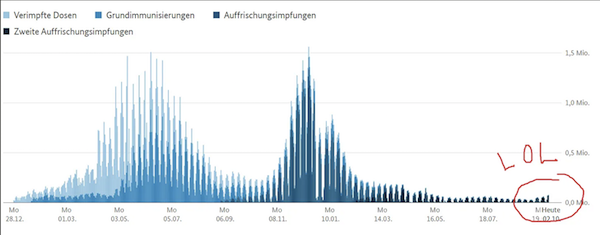
The medical bureaucrats are baffled, just baffled: “Unfortunately, interest in the fourth dose has been pretty low so far,” says Markus Beier, Chairman of the German Association of General Practitioners. At the same time, he says it’s important that people over 60 and those with previous illnesses in particular protect themselves with a further dose. “There is uncertainty among the population as to what further vaccinations will achieve. But they still strengthen protection against severe outcome.” Meanwhile, vast quantities of vaccine are expiring. At the end of August alone, 3.9 million doses of Moderna and another 700,000 doses of Novavax had to be binned.
The chart above tells the whole sordid story of our recent experiment with mass vaccination. Demand for this snake oil was highest in the beginning, before anybody had any direct experience with it; and in the Fall, when the government tied vaccination to specific social privileges. As overt vaccinator coercion has faded and millions of people have tried these doubtful elixirs for themselves, interest has all but entirely evaporated. This is the ultimate vindication for all those who have been saying that the vaccines are lousy overhyped pharmaceuticals with a bad side-effect profile. A safe and effective product would only gain momentum with the population. It took less than two years for these to wear out their welcome.




Struggle against reality
This 1979 clip from Monty Python’s Life of Brian perfectly encapsulates gender ideology in 2022, when pointing out biological reality is “oppression.” pic.twitter.com/YGHtAUqrk6
— Christina Buttons (@buttonslives) October 1, 2022

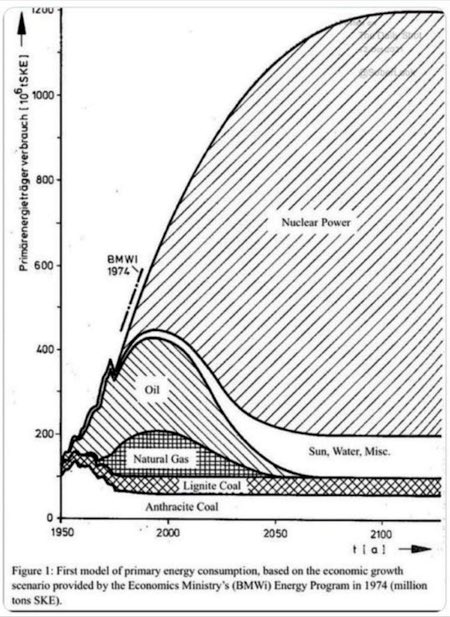
Energy projection mix of the German government in 1974

Octopus
Some scientists refer to octopuses not having eight legs, but six “arms” and two “legs,” because the two rear appendages are used to walk on the sea floor.pic.twitter.com/F8I2q4lSOt
— Fascinating (@fasc1nate) October 2, 2022

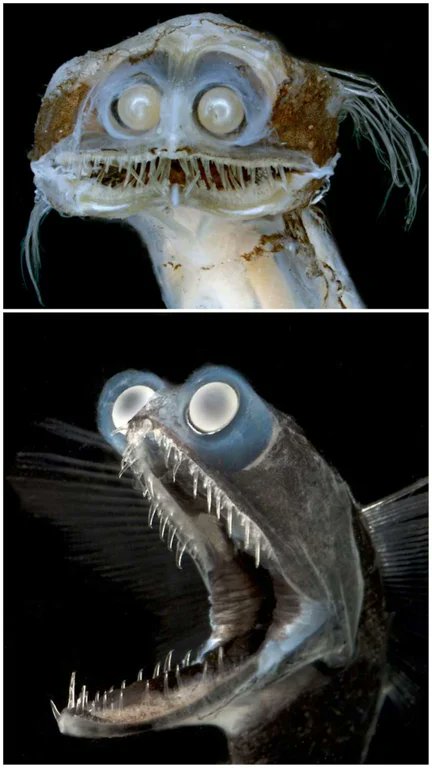
The telescopefish has large-lensed forward-pointing eyes—which are adapted for optimal binocular light collection and help them to better judge the distance of prey

Woody
— Wittgenstein (@backtolife_2023) October 2, 2022

Support the Automatic Earth in virustime with Paypal, Bitcoin and Patreon.









Home › Forums › Debt Rattle October 3 2022